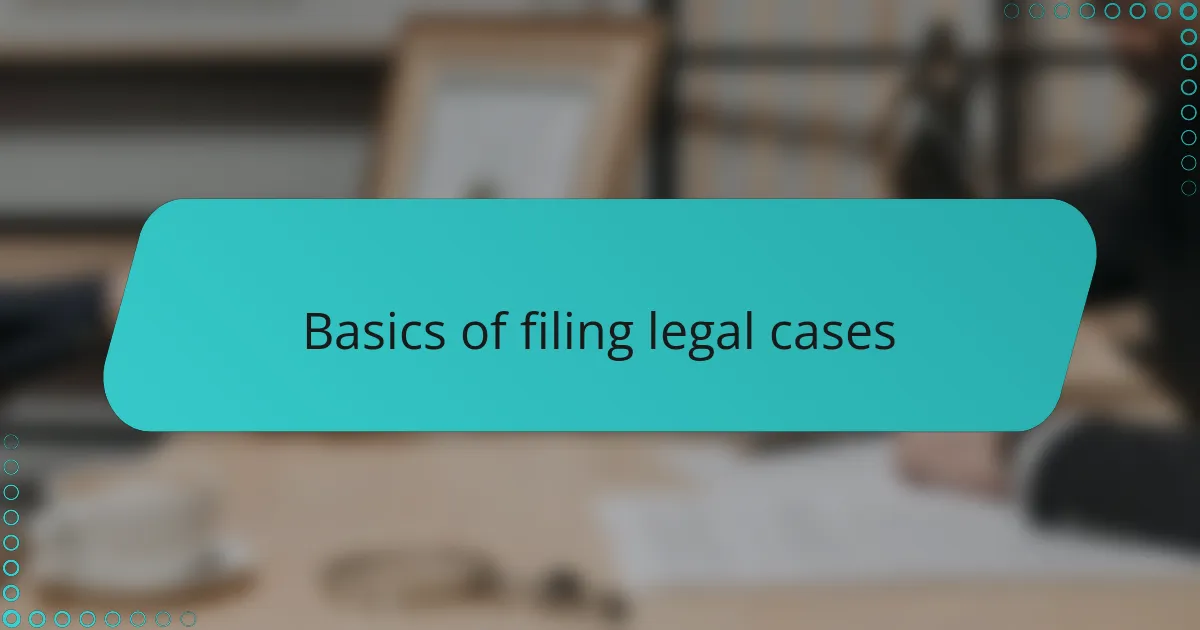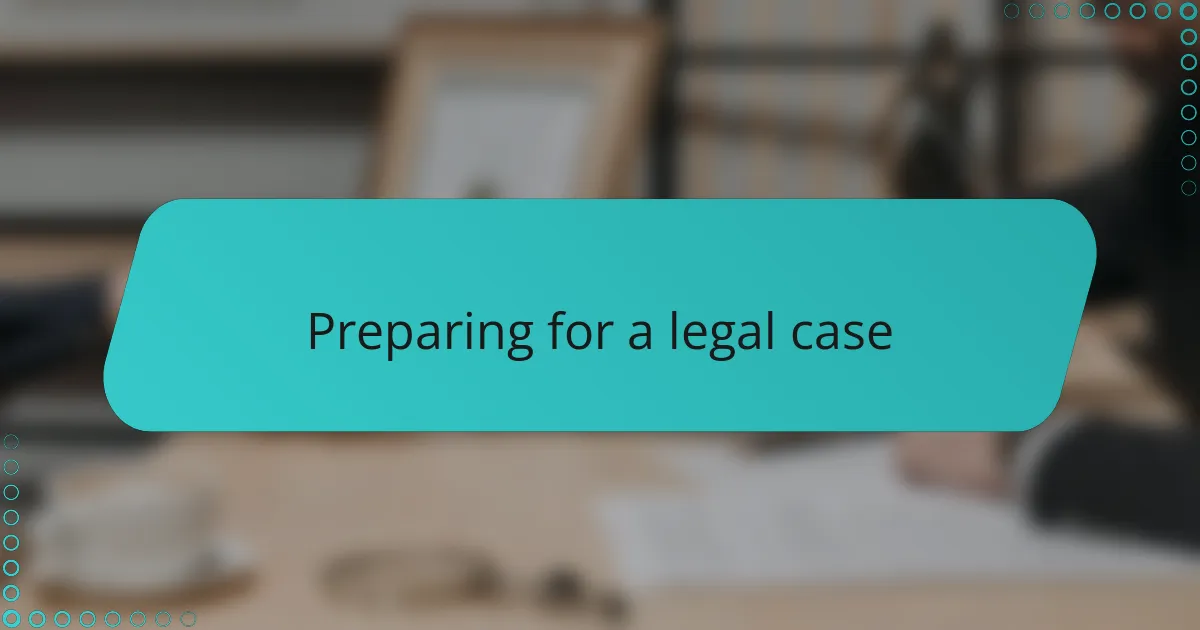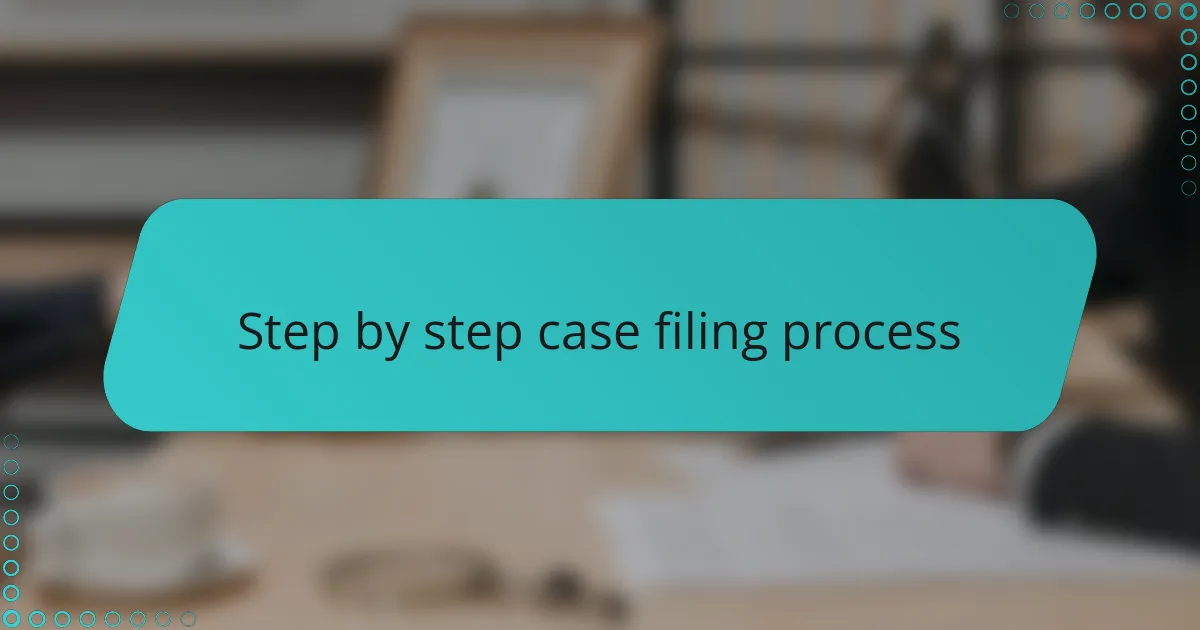Key takeaways
- Legal advocacy is essential for empowering individuals to assert their rights and make meaningful changes in their lives.
- Key steps in filing a legal case include understanding deadlines, choosing the right court, and ensuring all paperwork is accurately completed.
- Effective preparation involves gathering evidence, mental readiness, and consulting knowledgeable lawyers to navigate the legal landscape.
- Clear communication, patience, and attention to detail are crucial for overcoming challenges and ensuring a successful legal process.

Understanding legal advocacy
Legal advocacy, to me, is more than just navigating complex statutes—it’s about being a voice when someone feels unheard. Have you ever faced a situation where you knew your rights but didn’t know how to assert them? That’s where advocacy steps in, bridging the gap between confusion and clarity.
During my experience with filing legal cases, I realized that effective advocacy requires not only knowledge of the law but also genuine empathy. It’s about understanding the emotional weight behind every case and offering support beyond legal advice. This human element often makes the difference between success and frustration.
What struck me most was how advocacy transforms individual struggles into meaningful change. It’s a reminder that the law isn’t just rules on paper; it’s a tool for justice when wielded with care and determination. Have you ever considered how crucial it is to have someone who fights tirelessly on your behalf?

Basics of filing legal cases
Filing a legal case can feel overwhelming at first—trust me, I’ve been there. The basics start with understanding what kind of case you’re dealing with and gathering the necessary documents to support your claim. Have you ever felt unsure about where to begin? That initial step can make all the difference.
One thing I learned early on is that timing is crucial. There are strict deadlines, called statutes of limitations, that determine how long you have to file. Missing these can mean losing your chance to seek justice, which was a hard lesson from my own experience. It made me realize how important it is to act promptly.
Another essential part is choosing the right court and filling out the required forms accurately. At first, the paperwork felt like a maze, but breaking it down piece by piece helped. I found that being organized and methodical eased much of the stress and kept the process moving forward. Have you noticed how clarity can turn confusion into confidence?

Preparing for a legal case
Preparing for a legal case means rolling up your sleeves and getting organized before the real work begins. From my experience, gathering every little piece of evidence—documents, photos, even text messages—proved invaluable later on. Have you ever underestimated the power of details? I sure did, and it made a huge difference when presenting my case.
I also learned that mental preparation is just as important as paperwork. Facing a courtroom can be intimidating, and knowing what to expect eased my anxiety significantly. I kept reminding myself, “This is about seeking justice, not winning a battle,” which helped me stay focused and calm.
Finally, consulting with a knowledgeable lawyer early on changed everything. Their guidance helped me anticipate potential challenges and clarify the steps ahead. Have you ever felt lost navigating legal jargon? Having someone explain it in plain terms was a relief I wouldn’t trade for anything.

Step by step case filing process
Starting the case filing process felt like stepping into unknown territory. I began by drafting a clear complaint that laid out my concerns, making sure every detail was precise and supported by evidence. Have you ever noticed how organizing your thoughts on paper brings unexpected clarity?
Next came submitting the paperwork to the right court, which meant triple-checking forms and meeting deadlines. I remember feeling a mix of anxiety and relief when I handed everything over, knowing this was the official start of my journey. Did you know even a small mistake here can delay the entire process?
Finally, I had to serve the documents to the opposing party—a step that felt personal and procedural all at once. It struck me how important this formal notice is, as it sets the stage for the next chapter of the case. Have you ever experienced how these legal rituals transform abstract disputes into real, tangible actions?

Common challenges in case filing
One challenge I often faced was dealing with confusing legal jargon that seemed designed to trip me up. Have you ever stared at a form wondering if you’re interpreting it correctly? That uncertainty can make what should be a straightforward step feel like climbing a mountain.
Another hurdle was the sheer volume of paperwork and deadlines. I remember missing a crucial filing date early on, and the stress that followed was overwhelming. It taught me how unforgiving the system can be—and how vital it is to stay organized and vigilant throughout.
Perhaps the most frustrating was navigating delays caused by court backlogs or bureaucratic red tape. Waiting for a response felt like being stuck in limbo, with no control over when progress would happen. Have you ever felt powerless in a situation that demands patience but offers none? It’s a tough lesson in resilience.

Lessons learned from my cases
From my cases, I learned that patience is more than a virtue—it’s a necessity. Every delay or setback tested my resolve, making me realize that legal battles are marathons, not sprints. Have you ever found yourself doubting if the wait was worth it? Staying focused on the bigger goal helped me push through.
I also discovered that clear communication saves a lot of headaches. Early on, I overlooked the importance of keeping everyone—lawyers, clients, and even myself—in the loop. That gap led to misunderstandings that cost time and energy. Now, I make it a rule to ask questions and confirm details often, because clarity prevents costly mistakes.
Most importantly, I learned to trust the process, even when it felt frustrating or confusing. Legal systems aren’t perfect, but understanding their rhythm made me more adaptable and less anxious. Have you noticed how embracing small victories along the way builds confidence? Those moments made the tough days feel worthwhile.

Tips for successful legal filing
One tip I found essential for a successful legal filing is to double-check every document before submitting it. Early on, I once missed a small signature that delayed my case for weeks—an avoidable hiccup that taught me the power of thoroughness. Have you ever caught a tiny mistake just in time? That attention to detail can save you a lot of frustration.
Another piece of advice I’d give is to keep a checklist of deadlines and required documents. When I tracked everything meticulously, I felt more in control and less overwhelmed by the process. Deadlines can sneak up on you, so having a clear timeline was like having a roadmap for the journey ahead.
Lastly, don’t underestimate the value of clear, concise writing when drafting your filings. I learned that presenting facts simply and directly made it easier for judges and clerks to understand my case. Have you noticed how clarity shines a light through complexity? It might just be your best ally in getting your case heard.


